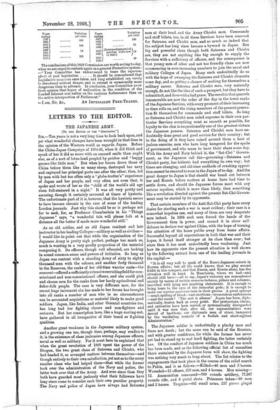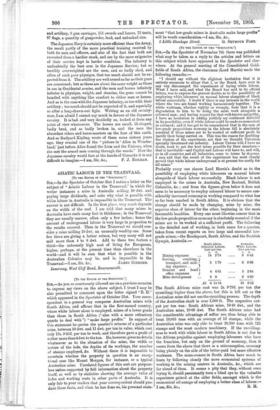LETTERS TO THE EDITOR.
THE JAPANESE ARMY.
[To THE EDITOR OP THE " SPECTATOR.")
Sin,—Ten years is not a very long time to look back upon, and yet what wonderful, changes have been wrought in that time in the opinion of the Western world as regards Japan. Before the China-Japan Campaign of 1894-95, when it did think and speak of her it did so more with an amused smile than aught else, as of a sort of lotus-land peopled by geishas and 'happy gnome-like little men." But when her forces drove those of China before than like so many sheep, destroyed her navy and captured her principal ports one after the other, then, led by men with but too often only a "globe-trotter's" experience of Japan and her people, and very often not even that, it spoke and wrote of her as the "child of the world's old age risen full-statured in a night." It was all very pretty and amusing, though it certainly savoured at times of hysteria. The unfortunate part of it is, however, that the hysteria seems to have become chronic in the case of some of the leading London journals. Just why this should be so is perhaps not far to seek, for, as Professor Chamberlain in his "Things Japanese" says, "a wonderful tale will please folk at a distance all the better if made more wonderful still."
As an old soldier, and an old Japan resident and late instructor in her leading Colleges—military as well as civilian- i would like to point out that while the organisation of the Japanese Army is pretty nigh perfect, perhaps too much so, much is wanting in a very goodly proportion of the material composing it. Its officers, though well educated, are lacking in sound common-sense and powers of initiative. So long as Japan was content with a standing Army of sixty to eighty thousand men with the colours, and another forty thousand in the Reserves, the ranks of her old-time warrior caste—the samurai—offered a sufficiently extensive recruiting field for com- missioned and non-commissioned officers, and she could pick and choose men for the ranks from her hardy agricultural and fisher-folk people. The ease is very different now, for the recent huge increment she has made to her forces has brought into all ranks a number of men who in no circumstances can be accounted acquisitions or material likely to make good soldiers. Japan, like India, and other Oriental countries too, has long had her fighting classes and non-fighters and outcasts. But her conscription laws, like a huge casting-net, have gathered in all irrespective of their breed or fighting qualities.
Another great weakness in the Japanese military system, and a growing one too, though time, perhaps, may eradicate it, is the existence of class jealousies among Japanese officers, naval as well as military. For it must here be explained that when the great revolution of 1868 upset the power of the Shogun, the two great clans of Satsuma and Closhn, who had headed it, so arranged matters between themselves—and though entirely to their own satisfaction, yet not so to the many smaller clans who had helped them—that while the former took over the administration of the Navy and police, the latter took over that of the Army. And ever since then they both have guarded most jealously what their followers have long since come to consider each their own peculiar property. The Navy and police of Japan have always bad Satsuma
men at their head, and the Army Choshfi men. Commands
and staff billets, too, in all these Services have been reserved for Satsuma and Chosha men, and so much so indeed that the subject has long since become a byword in Japan. But big and powerful clans though both Satsuma and Chosb a are, they are not anything like big enough to supply the Services with a sufficiency of officers, and the consequence is that young men of other and not too friendly clans are now
commencing in ever-increasing numbers to join the naval and military Colleges of Japan. Many such undoubtedly do so with the hope of swamping the Satsuma and ChOshil elements some day, and so getting a chance of making for themselves a military career. Satsuma and Choshe men, very naturally enough, do not like the idea of such a prospect, but they have to
submitto it, and do so with a bad grace. The result is that quarrels innumerable are now the order of the day in the lower ranks of the Japanese Services, with every prospect of their increasing as time rolls on, and the rising members of the present genera- tion fit themselves for commands and staff billets. So long as Satsuma and Choshfi men ruled supreme in their own par- ticular Services everything went as smooth as possible, for loyalty to the clan is unquestionably one of the greatest virtues the Japanese possess. Satsuma and Choshil men have un- doubtedly done great and good service for their country; but in the doing of it they have raised around them a hoot of jealous enemies, men who have long hungered for the spoils of government, and who mean to have their share some day.
With the Army and Navy behind it, the " Sat-Ch6 " Govern- ment, as the Japanese call the—governing—Satsuma and Choshu party, has hitherto had everything its own way; but times are changing, and old-time methods of crushing opposi- tion cannot be resorted to even in the Japan of to-day. And the great danger to Japan is that should war break out between her and Russia before matters at home have had time to settle down, and should the Japanese forces meet with any serious repulses, which is more than likely, then something like a revolution directed against the present Sat-Ch6 Govern- ment may be started by its opponents.
That certain members of the Anti-Sat-Ch6 party have every desire for starting such a war is most evident; their case is a somewhat hopeless one, and many of them are very desperate men indeed. In 1894 such men forced the hands of the Government then in power, and caused it in sheer self- defence to declare war against China, with the hope of turning the attention of the home public away from home affairs. Successful beyond all expectations in both that war and their hopes, it found itself stronger at its close than ever ; but
since then it has most undoubtedly been weakening. Just how its opponents view the present situation is well shown by the following extract from one of the leading journals in the capital :—
" It is all very well to speak of the Russo-Japanese entente in Korean affairs; but all the world knows that we play second fiddle in this compact, and that Russia, and Russia alone, has the situation well in hand. In Manchuria, where we had—and should still have !—all to say, Japan's victories are remembered mainly by means of certain memoria technica, pillars and columns, inscribed with lying and insulting statements. It is enough to bring tears to the eyes of the immortal gods; it is enough to make our warrior ancestors turn in their graves. A great splurge —much spilling of blood—vast exertions—tremendous enthusiasm —and the result? • The rest is silence.' Japan has been, diplo- matically, beaten back at every point. Her pretensions, claims, and entreaties have been waived, or systematically disregarded until it was seen that, after all, our representatives were devoid of backbone, our diplomats men of straw, hampered by the vacillating councils of a foolish and short-sighted Administration."
The Japanese soldier is undoubtedly a plucky man and fears not death ; but the same can be said of the Russian, and with greater confidence, for while the former has never yet had to stand up to real hard fighting, the latter certainly
has. Of the conduct of Japanese soldiers in China too much has been made, and as the following official list of casualties there sustained by the Japanese force will show, the fighting was nothing very much to brag about. The list relates to the engagements that took place in the Course of the relief march to Pekin, and is as follows :—Killed-7-46 men and 3 horses.
Wounded-15 officers, 233 men, and 4 horses. Men missing- 12. Ammunition consumed-769 rounds artillery, 77,247
rounds rifle, and 6 pistol shots. Prisoners taken-80 men and 2 horses. Trophies-441 small arms, 237 pieces gingal
and artillery, 8 gun carriages, 151 swords and lances, 73 tents, 87 flags, a quantity of gunpowder, lead, and unhusked rice.
The Japanese Navy is certainly more efficient than the Army, the result partly of the more practical training received by both its men and officers, and also of the fact that both are recruited from a hardier stock, and are by the mere exigencies of their service kept in harder condition. The infantry is undoubtedly the best arm in the Japanese Service; but so terribly overweighted are the men, and so badly shod, and often of such poor physique, that too much should not be ex- pected from it. The artillery are well armed so far as their guns are concerned; but as these are about the same weight as those in use in Occidental armies, and the men and horses infinitely inferior in physique, weight, and stamina, the guns cannot be handled with anything like comfort to either men or horses. And as is the case with the Japanese infantry, so too with their artillery ; too much should not be expected of it, and especially so after a long-drawn-out fight. Writing as an old cavalry- man, I am afraid I cannot say much in favour of the Japanese cavalry. It is bad, and very decidedly so, looked at from any point of view whatsoever. The horses are small, ill-shaped, badly bred, and as badly broken in, and the men the absurdest riders and horse-masters on the face of this earth. And as Rudyard Kipling wrote of them some sixteen years ago, they remind one of the "picture in Alice in Wonder- land,' just before Alice found the Lion and the Unicorn, when she met the armed men coming through the woods." How the Japanese cavalry would fare at the hands of Cossacks it is not
difficult to imagine.—I am, Sir, &c., F. J. NORMAN.



















































 Previous page
Previous page